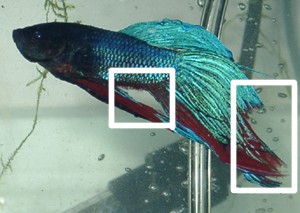Q: TT wrote,
My bettas fins look like they are melting away. They started to fall off a couple of days ago and then this morning they looked even worse. He isn’t swimming much. I don’t understand what is happening and I can’t find the fin pieces anywhere in the bowl. I am really worried that he won’t be able to swim soon.
A: If his fins are falling off suddenly and in large chunks over several days then it sounds like he could have severe fin rot, which is a common bacterial infection as opposed to an injury where the fin is torn [from another fish or by snagging on something]. Fin rot is usually the direct result of poor water quality. In an unfiltered bowl, toxins like ammonia and nitrite can build very quickly. These compounds are the result of fish waste and decaying food or plant matter. To keep Bettas healthy, you don’t want any ammonia or nitrite in the water at all. The only way to keep it in check is to do frequent full water changes before any dangerous toxins have a chance to build. I suggest cleaning all the water out of your bowl and replacing it with fresh, conditioned water that matches the old water temperature as closely as possible (with in a Fahrenheit degree or two). The smaller the bowl, the more frequently you will need to change the water. Consider purchasing an ammonia test kit to help you keep an eye on things. If you see any ammonia registering on the test then you need to do more water changes. Remember, ammonia is so toxic that even as little as .25 ppm (parts per million) can leave lasting effects.
To keep ammonia at bay, clean the tank often and remove any uneaten food or decaying plant mater as soon as possible. Try not to overfeed your betta.
If the fin rot is severe, more then half the fin is missing, you may need to turn to an antibiotic like Minocycline or Kanamicyn. I like to use Mardel’s Maracyn-Two. Be careful to follow the directions on the package closely. When the fin rot has subsided, clean water and vigilance will help the fins regenerate. Bettafix or half-strength Melafix may also be useful to help fins regenerate after the antibiotic treatment is over, though I don’t recommend them for the initial treatment because their antibiotic properties aren’t that great. As an anticeptic, they work pretty well.
To learn more about treating Bettas with Fin Rot visit the Fin Loss & Fin Rot page at Nippyfish.net

Leave a Reply